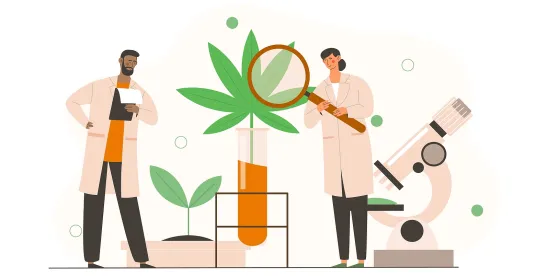Humans possess several well-established bodily systems, including the sympathetic nervous system, the central nervous system, and the endocrine system. A relatively recent discovery is the endocannabinoid system (ECS). Understanding the ECS is essential for comprehending the effects of cannabis and its compounds on the body, particularly in therapeutic applications.
Endocannabinoids are naturally occurring compounds in the body that bind to cannabinoid receptors located throughout the body. The ECS regulates physiological processes such as mood, appetite, sleep, immune response, pain sensation, memory, and growth and development. The ECS is present and active regardless of cannabis use. Compounds in cannabis, including THC (tetrahydrocannabinol) and CBD (cannabidiol), interact with the ECS by binding to the endocannabinoid receptors. THC can produce psychoactive effects when binding with these receptors, while CBD interacts indirectly and provides therapeutic benefits without causing a high. Current research is focused on the effects and benefits of cannabis-based medical products for adolescent diseases, including childhood cancer, treatment-resistant epilepsy, and Sturge-Weber Syndrome (SWS), a rare congenital disorder characterized by a facial birthmark, abnormal blood vessels in the brain, and eye abnormalities.
Current research is focused on the effects and benefits of cannabis-based medical products for adolescent diseases, including childhood cancer, treatment-resistant epilepsy, and Sturge-Weber Syndrome (SWS), a rare congenital disorder characterized by a facial birthmark, abnormal blood vessels in the brain, and eye abnormalities.
In 2018, the U.S. Food and Drug Administration approved Epidiolex oral solution (highly purified CBD) for the treatment of seizures associated with two severe forms of epilepsy, Lennox-Gastaut syndrome and Dravet syndrome, in patients two years of age and older. Since then, scientists have studied whether Epidiolex is effective in treating pediatric patients with SWS. In 2024, researchers summarized early data on Epidiolex’s efficacy for preventing and treating epilepsy and neurocognitive impairments in patients with SWS. In their review, researchers found that CBD interacts with endocannabinoids and produces an anti-inflammatory, neuroprotective, and anti-epileptic effect. In addition to reduced seizure activity, patients demonstrated improvements in cognitive, behavioral, and motor functions as well as quality of life.
In another recent study, researchers conducted a review of published literature evaluating the use of cannabis in pediatric oncology patients. The review evaluated the safety, dosing, and effectiveness of cannabis products for managing symptoms in children with cancer. After examining ten observational studies involving 1,529 children and nine interventional studies with 398 participants, the researchers determined that cannabinoids may be beneficial in managing pain, nausea, and vomiting in pediatric patients, particularly when traditional pharmaceuticals are ineffective. The researchers explained that cannabinoids bind to cannabinoid 1 receptors of the ECS and prevent the release of emetogenic neurotransmitters, the chemical messengers that trigger nausea and vomiting. Notably, no serious cannabis-related adverse events were reported across all studies, but researchers underscored the need for further investigation into the composition of cannabis products, appropriate dosages, and potential drug interactions.
Research on cannabinoids and the ECS is evolving, with promising therapeutic applications for various health conditions. We will keep monitoring this research to uncover its potential benefits for adolescents and adults.




 />i
/>i

